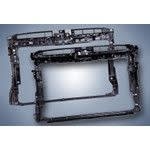 The front end carrier in the new Golf 7 is completely made from plastic. This makes the part that owes its shape to elaborate calculations and simulations one of the world's first front end carriers without metal reinforcement. Replacing the previous polypropylene hybrid part with an all-plastic part required use of not only Ultramid® B3WG8, a highly reinforced polyamide during development, but particularly Ultrasim®, the simulation tool from BASF. The sheet steel parts that had been attached previously are now eliminated. This reduces the weight of the front end module significantly compared to that of the predecessor model, saving assembly time and thus costs. Volkswagen produces the part in-house.
The front end carrier in the new Golf 7 is completely made from plastic. This makes the part that owes its shape to elaborate calculations and simulations one of the world's first front end carriers without metal reinforcement. Replacing the previous polypropylene hybrid part with an all-plastic part required use of not only Ultramid® B3WG8, a highly reinforced polyamide during development, but particularly Ultrasim®, the simulation tool from BASF. The sheet steel parts that had been attached previously are now eliminated. This reduces the weight of the front end module significantly compared to that of the predecessor model, saving assembly time and thus costs. Volkswagen produces the part in-house.In addition to limited space for installation, the requirements to the all-plastic part include a variety of very challenging load cases: among them, static and dynamic hood latch failure, where incorrect opening and closing of the engine's hood is simulated and tested under the harshest conditions. At the same time, the stiffness and vibration behavior of the system comprising front end and radiator was optimized on the basis of CAE analyses and validated in an actual vibration test.
Special attention was devoted to the crash sensors attached to the front end. They ensure deployment of the airbag at the right moment in the event of a head-on collision. For this, the plastic part must exhibit a certain dynamic stiffness at a defined location and satisfy the automaker's crash acceleration requirements. In a real-world test, the vibration response of the part corresponded exactly to what was designed and predicted by Ultrasim: The Ultramid front end carrier transmits the collision signal correctly.



